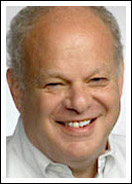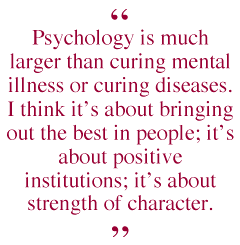
Welcome to the ezine produced by SGI Buddhists that prompts the positive, kindles the constructive, highlights the hopeful and leaves you feeling - well, up!

 Can we learn to be optimistic and 'unlearn' pessimism? According to one of the world's leading psycohologists, we can.
Can we learn to be optimistic and 'unlearn' pessimism? According to one of the world's leading psycohologists, we can.
By Geraldine Royds
'Optimism is hope,' says Dr Martin Seligman. 'It is not the absence of suffering. It is not always being happy and fulfilled. It is the conviction that though one may fail or have a painful experience somewhere, sometime, one can take action to change things.'
Dr Martin EP Seligman is an American psychologist and writer, known for his pioneering work on positive psychology, learned helplessness, optimism and pessimism. According to Seligman, optimistic people are more likely to succeed at work and in personal relationships. They are healthier and live longer. By changing our way of thinking, he says, we can change our lives.Born in Albany, New York, in 1942, Seligman is married with seven children. He confesses that he is a born pessimist and he had to learn to be optimistic. It was his father's death, he says, that lead him in this direction. When Seilgman was only 13 his father suffered a series of strokes that left him paralyzed. Losing all hope, his father remained in despair until his death. Seeing this, Seligman decided to study what it is that makes people feel powerless, and to look at ways of overcoming these feelings.
 By the time Seligman finished
his PhD at Penn in 1967, he had already become internationally known for his
work. His ground-breaking theory of
learned helplessness - which argued that a major component of depression was a
learned pessimistic attitude - led to a breakthrough in the treatment and
prevention of depression. During the 1970s and 1980s, he was a driving force
for changing the way we define psychological health. Realizing that for most of its history psychology
has largely focused on mental illness, Dr Seligman increasingly turned his
attention to what makes human beings flourish.
By the time Seligman finished
his PhD at Penn in 1967, he had already become internationally known for his
work. His ground-breaking theory of
learned helplessness - which argued that a major component of depression was a
learned pessimistic attitude - led to a breakthrough in the treatment and
prevention of depression. During the 1970s and 1980s, he was a driving force
for changing the way we define psychological health. Realizing that for most of its history psychology
has largely focused on mental illness, Dr Seligman increasingly turned his
attention to what makes human beings flourish.
Today, Seligman is recognized as the world's preeminent authority on optimism. Rob Hirtz of The Pennsylvania Gazette reports that it wasn't until the late eighties when Seligman meet with literary agent Richard Pine, to talk about a mass market book, that he began to view his extensive research on learned helplessness from another angle.
'At the end of that meeting, as I was walking to the door,' Seligman relates, 'Richard said, "I'm going to give you a gift: Learned Optimism - that's your title.'' Until that moment I had been under the impression that I'd been studying pessimism all those years.'
Learned Optimism became a world bestseller. It outlines a new set of cognitive skills that help people to be optimistic, resist depression, and accomplish more.

Seligman also broke new ground in the early 1990s with the Penn Depression Prevention Program, which has repeatedly reduced by half the occurrence of depression in children. Seligman and his colleagues went on to prove that learning the skills of optimism not only immunizes children against depression but it also boosts physical health and school performance. This work is detailed in Seligman's book The Optimistic Child.
In 1998 Seligman was elected President of the American Psychological Association - by the largest vote in modern history.
One of his major initiatives concerned the prevention of ethnopolitical warfare. He launched a task force with the remarkable goal of gaining funding for psychological investigations and interventions that might prevent wars caused by ethnic conflicts.
'How many people would say to themselves, "What can I do about ethnopolitical warfare?''' a colleague, Dr Susan Bennett Johnson, comments. 'And yet, Marty's convinced lots of talented people to devote loads of time and effort to this project.' The Solomon Asch Center for the Study of Ethnopolitical Conflict already has collaborators from universities around the world.
His other major initiative was the creation of the field of Positive Psychology.
'Almost everything I've done that involved big changes in life has happened in a flash. This happened when my daughter Nikki and I were gardening, and she was just five. I should confess that when I garden, I'm goal-directed, time-urgent. Nikki was throwing weeds in the air and dancing around, and I yelled at her. She came back to me and said, "Daddy, do you remember before I was five, I whined all the time, I whined everyday? Did you notice that since my fifth birthday I haven't whined at all?" I said, Yes, Nikki. "Well, Daddy, that was because on my birthday I decided I wasn't going to whine anymore. It was the hardest thing I've ever done. And if I can stop whining, you can stop being so grumpy!"
In a flash I saw three things: first that she was right about me, I really was a nimbus cloud, and probably any success I had in life was probably not due to being a grouch but was in spite of it. And I saw that our usual theory of child-rearing was incorrect. I realized my job with Nikki was not to correct her errors but to take this virtue that she had just shown and somehow amplify it, help her use it as a buffer against troubles. That raised the question of strength and virtue,' Seligman says.
 Looking back on 'learned helplessness', he
reflected that one in three subjects never became helpless, no matter how many
shocks or problems beset them. 'What is
it about some people that imparts buffering strength, making them invulnerable
to helplessness?' Seligman asked himself and set off to find out.
Looking back on 'learned helplessness', he
reflected that one in three subjects never became helpless, no matter how many
shocks or problems beset them. 'What is
it about some people that imparts buffering strength, making them invulnerable
to helplessness?' Seligman asked himself and set off to find out.
Since 2000 his main mission has been the promotion of Positive Psychology, including the study of positive emotion, positive character traits, and positive institutions. His aim for the coming years is that 'we will be able to make the parallel claim about happiness; that is, in the same way I can claim unblushingly that psychology and psychiatry have decreased the tonnage of suffering in the world, my aim is that psychology and maybe psychiatry will increase the tonnage of happiness in the world.'
Dr Martin EP Seligman has written several hundred articles and more than
twenty books on optimism and the creation of happiness. He is the recipient of
many awards and his work has been supported by a number of world renowned
institutions. Seligman is currently Fox Leadership Professor of Psychology at the University of Pennsylvania.

